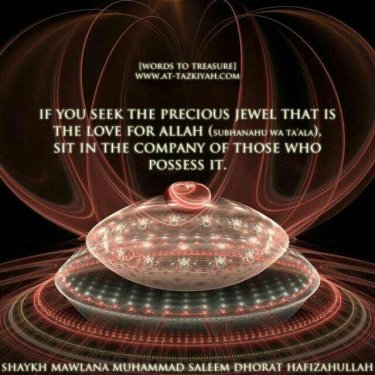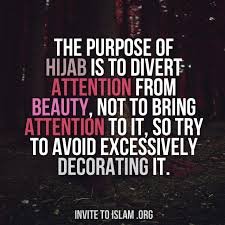Leaderboard
Popular Content
Showing content with the highest reputation since 10/19/2017 in Posts
-
Allahu Akbar, Walillahil-Hamd First Taraweeh in 88 years will be led by (Maulana) Professor Ali Erbas (HA), himself tonight2 points
-
As-Salaam alaikum, Have you ever considered the acquisition of the sweetness of faith (Imaan) and that immense enjoyment in the worship (Ibaadah) we do? The pleasure a person finds in his Sallaah impels him to delay his Sajdas. His Zikr of Allah Ta'ala emanates from the deep recesses of his heart... intoxicating him. The requirement for this intoxication and ecstasy is not wine or worldly love; the requirement for this 'high' is neither heroine nor cocaine, it is the Remembrance of his Beloved Lord (Allahu). When he recites the Holy Qur'an, it is as if he is conversing with his Rabb. The Speech of Allah Ta'ala, which he recites, deeply impresses upon his heart and establishes a profound and strong Imaan within him. With a deep hearted enjoyment, he believes that his Lord, Allah, is listening to His Own Kalaam (Speech) from the tongue of His sinful servant. Allahu Akbar! Wa Lillahil-Hamd!!2 points
-
Read here: https://www-independent-co-uk.cdn.ampproject.org/c/s/www.independent.co.uk/voices/september-11-guantanamo-bay-war-on-terror-afghanistan-b1917879.html?amp2 points
-
From Afghan women regarding Afghan women VID_150010127_044805_681.mp4 VID_150010715_052943_075.mp4 VID_150010827_104245_366.mp42 points
-
Thank you very much respected Admin for publishing my post. I shall abide by the rules and regulations of this site by the grace of God. Mohammad Rafique Etesam ( shaikhrafiquee)2 points
-
wa'alaykumus salam warahmatullah I asked and recieved following reply so it can be done but I dont think people with websites would take the risk2 points
-
This is the stance of Islamic political parties: https://www.dawn.com/news/amp/1641051 I don't know of any Deobandi madrasah in Pakistan that does not hail and support Afghan Taliban. Ghair muqallideen / ahle hadith Ulama also support them. I've heard them showing approval and praising them in their speeches but I don't know if they support them in any other way.2 points
-
2 points
-
Amount of water used by Nabi (sallallahu alaihi wasallam) for wudhu and ghusl Q: How many litres of water would Nabi (sallallahu alaihi wasallam) use for wudhu and for ghusl? A: Hazrat ‘Aaishah (radhiyallahu anha) reports that Rasulullah (sallallahu alaihi wasallam) used one mudd of water for wudhu and one saa’ for ghusl. One mudd amounts to approximately 1.03 litres and one saa’ is approximately 4.1 litres. And Allah Ta'ala (الله تعالى) knows best. عن أنس رضي الله عنه قال: كان النبي صلى الله عليه وسلم يغسل، أو كان يغتسل، بالصاع إلى خمسة أمداد، ويتوضأ بالمد (صحيح البخاري، الرقم: 201) عن عائشة رضي الله عنهاأن النبي صلى الله عليه وسلم كان يغتسل بالصاع ويتوضأ بالمد (سنن أبي داود، الرقم: 92) فتاوى محموديه 8/122 أحسن الفتاوى 4/386 تأليفات رشيديه صـ 245 Answered by: Mufti Ebrahim Salejee (Isipingo Beach)2 points
-
At the moment I'm celebrating as well as being wary. Just because they are the Taliban, we shouldn't give them a free pass. In fact they should be held to a stricter standard. It's very early days so let's wait and see how things pan out. I don't know what their justification is in forming a relationship with China, but I'm hoping and praying that it is all in Allah's plan and inshallah we shall see the benefit. My mind keeps thinking back to the treaty of hudaibiya and how it ultimately lead to our benefit. The first time Taliban took over, they allowed the losing side to join Taliban and gave them the same positions they held when they were in opposition to the Taliban. They also allowed the opposition to hold official positions in some areas such as Kabul. I can understand their hikmat behind this, but it backfired. The ex opposition holding positions in the Taliban gained numbers and strength and caused problems for the main leadership, including ameerul mumineen mullah umar (rh). I hope this doesn't happen again. I think this is a very critical time and the Taliban need help and support from our scholars, world leaders, and general awaam.2 points
-
2 points
-
No he is not a scholar, just a student of knowledge But I think he can make a lot of contribution in Maliki fiqh discussion2 points
-
Mufti Muhammad Shafi Explaning following incident with Shaykh al-Hind Moulānā Mahmūd al-Hasan Someone once asked Shaykh al-Hind about the hadith: “The Prophet ﷺ has said that Satan does not pass the road which is used by 'Umar." Because the same or similar was not said in relation to the Prophet ﷺ or Abu Bakr (رضي الله عنه), the question naturally arises as to why Satan should have feared Umar (رضي الله عنه) alone, even though both the Prophet ﷺ and Abu Bakr (رضي الله عنه) enjoyed a higher status than him. Mufti Muhammad Shafi' said that in responding to any kind of critical question, Shaykh al-Hind would usually commence with a pointed, but humourous kind of remark, before providing a more comprehensive reply. Hence, it came as no surprise that in answer to this question, he opened with a quick-witted observation: "It is Satan's own stupidity. I think you had best ask him why he feared Umar (رضي الله عنه ) more than the Prophet ﷺ or Abu Bakr (رضي الله عنه)!" He then cogently proceeded to offer the following explanation: "Superiority and awe are two different things. A superior person may not necessarily be the most dreaded person. In the case of Umar (رضي الله عنه) the quality of awe was a predominant characteristic, and its presence was what the hearts of the people felt most immediately. On the other hand, in the case of the Prophet ﷺ and Abū Bakr (رضي الله عنه), the quality of beauty was what predominated in their characters. Given this contrast, the immediate sense of awe when confronted with 'Umar (رضي الله عنه) is not surprising." [The Great Scholars of the Deoband Islamic Seminary by Mufti Muhammad Taqi Usmani]2 points
-
I am not an Arab I am not from the Middle-East I don't speak Arabic But why does Palestine matter to me as a Muslim and as a human? How did we get here through the lens of history? https://youtu.be/RbLEiTbzCqI2 points
-
Assalaamu ‘alaykum warahmatullah I will try to answer your question to the best of my ability according to what I have learnt in these “billion courses and gazillion articles”. On a side note, these courses and articles are mostly very basic, outlining the maxims for awareness. The only in-depth courses in the UK that I know of were conducted by Ustadhah Hidaya Hartford and Mufti Abdul Rahman Mangera sahib. I know there is one in Pakistan which is in Urdu and which many UK sisters have joined. Regarding: Absolutely agree with you. They probably did not even have calendars and definitely no apps and probably did not even need to record their cycles (due to the points I’ll mention below) so no dispute with you or the Mufti sahib you consulted. In order to answer your question regarding, “why this issue is so complex that it needs tables and Apps to track” I will insha-allah first have to explain some important points which have bearing on the answer. I’ll try to be as brief as possible 1 Knowledge of Sahaabiyaat RA compared to women today: The Sahaabiyaat RA lived with none other than the source of all knowledge (sallallaahu ‘alayhi wasallam) whom they consulted through his Azwaaji Mutahharaat RA regarding these issues and would therefore be knowledgeable in this regard. Generally, among women today, ignorance of fiqhi issues prevails to the extent that many women are not aware of the faraaidh of ghusl and wudhu – not saying all women are ignorant as Alhamdulillah Allah ta’ala has blessed women great uloom throughout the ages till today 2 Things which Impact menstrual cycles: Allah ta’ala ordained for women to go through the menstrual cycles and post-natal bleeding from day one yes, however women through the ages lived in different environments which impacted their cycles differently. Many things which affect women’s cycles today were unknown in the time of the Sahaabiyaat RA. Various illnesses exist today which were unknown even a few generations ago let alone in the time of the Sahaabiyaat RA. The illnesses themselves or their treatments, medication, etc. affect women’s cycles. Added to that, there are various forms of contraception Muslim women use in our age, almost all of which cause problems with women’s cycles. The food and drink consumed today also affects women’s cycles Stress, anxiety, depression, etc. was most probably unknown in their time and this also affects women’s cycles. All this information can be verified online. 3 For non-Muslim women all of the above does not create any issue whereas the very core of the Deen is affected for Muslim women where their obligatory worship which requires the state of purity is affected (5 daily prayers, fasting of Ramadhaan, the main Tawaf of Hajj). Therefore, Muslim women need to know the basic rules of when they are allowed to continue these obligations and when to refrain and that is why there are so many books, articles and courses. 4 Misconceptions One of the greatest misconceptions that exists among many cultures is LEAVING OUT the obligatory acts of worship which require the state of purity once any type of bleeding begins. This is sinful as there are situations where a woman may be bleeding however it is termed “Istihadha” (Irregular bleeding, invalid bleeding) during which she must continue carrying out those acts of worship. 5 Few facts regarding women’s bleedings Now towards why women need to keep a record of their cycles. The Shari’ah has set out maxims regarding menstruation and post-natal bleeding. A woman’s blood can by one of three types – menstruation (haydh), post-natal (nifaas) or invalid Istihadaha). These maxims help determine which type of bleeding a woman is experiencing and as mentioned before, this impacts her obligatory acts of worship. Women develop “habits” in menstruation and purity and in the bleeding after childbirth. Please remember this point. Everything is simple as long as women’s cycles remain within the limits set out by the Shari’ah. (Note that differences of opinion exist between the Madhaahib and even within the Hanafi Madhab as these are ijtihaadi Masaail) Problems only arise when bleedings are abnormal/invalid. Many women do not experience many problems however problems do usually arise at the following stages of a woman’s life; At adolescence – Girls s begin menstruating at a much younger age than before and some start off with no regular habits and actually experience continuous or intermittent bleeding or spotting without having a complete purity of 15+ days in between bleedings (which separates two bleedings). This is generally a straight forward issue where they are “given” habits in both menstruation (10 days) and purity (20 days) which is used to determine when they can carry on their acts of obligatory worship and when they are required to refrain After child-birth – many women continue bleeding after the maximum 40 days creating confusion regarding acts of worship During menopause – most women experience a total change in their cycles from ages as early as 45 nowadays where bleeding occurs frequently without the required 15+ day purity occurring between bleedings. Use of contraception – is the most common cause of irregular bleeding for women whatever their age Keeping all the above in mind, now the answer to the question: Answer: Any ‘Aalim/Mufti will tell you that previous habits are necessary when blood exceeds the maximum or when it is continuous – by continuous I mean there is no occurrence of a complete purity of 15+ days and this situation can last for months. Experience shows that most women simply stop praying when they experience any type of bleeding or spotting no matter how long it carries on. They only consult Apas when they are made aware by someone with more knowledge. The Mudhillah is a woman who has forgotten her habits (not recorded them). For the Mudhillah the situation can get extremely serious when she suddenly experiences problematic cycles (Hardly any women remember their exact days of previous bleedings and purity as they generally fluctuate) because it is impossible to determine the bleedings without previous habits. In some extreme cases, some women may have to perform ghusl (obligatory ritual bath for full body purification) BEFORE EVERY PRAYER and thereafter repeat it in the next prayer time. However, at these times (in some cases) they may be allowed to take dispensations from other Madahaahib which is an extreme mercy of our Most Gracious Lord! And this is why there are these “billion courses and gazillion articles” so as to educate and empower women in their Deen. And this is the reason why great Fuqahaa of the past have written hundreds of treaties on the subject and as ʿAllaamah Ibn ‘Aabideen Al-Shaami (Rahimahullah) says in ““Manhalil Waarideen min Bihaaril Faydh ‘alaa “Dhukrul Muta-aahileen fee Masaailil Haydh” (The kitab taught by Mufti Abdur Rahmaan Mangera sahib) [the fuqaha have agreed on the mandatory nature of the obligation of knowing the necessary states of a person] This is to have knowledge of that ruling, which a person is in need of, at the time he is in need of it. By learning these rules in these “billion courses and gazillion articles” and following them, women are in fact worshipping their Lord. Isn’t our Deen the most beautiful?! Apologies as I could not answer in just a few sentences and also for saying you were being “Rather selfish” but this is exactly how it appears from your own words however it my not be so.2 points
-
2 points
-
Aameen to lovely Du'a and its so good to see this topic continued, Jazaakillah Can you please double check the spelling in thsi word ? - ثَوَابَلهُ2 points
-
2 points
-
There are various learning resources available online. Please refer to this section and see if they are offering Arabic course inshaAllah. http://www.islamicteachings.org/forum/category/169-online-learning-resources/2 points
-
Rectified motives and reformed children The Honourable Hadith expert of our times, Al-Muhaddith, Shaykh Muhammad ‘Awwamah (may Allah protect him) often states that the residents of Madinah Munawwarah regularly make the following du’a: اللّٰهُمَّ أَصْلِحِ النِّيَّةَ والذُّرِّيَّةَ Allahumma aslihin niyyah wadh dhurriyyah Translation O Allah, rectify my intentions and reform my progeny. This brief yet profound du’a is much needed in the world today. Ponder: One who is bereft of the above two bounties will suffer in both Worlds! Intentions and the Selfie Age Unfortunately we live in an era where almost nothing is done without an ulterior motive. It’s an era wherein everything is ’selfied’, be it with a picture or even in text. Without the correct motive, no deed is accepted by Allah Ta’ala, even if that deed be as noble as it gets. We should still be focused on our intentions, instead of broadcasting our achievements! A Rare Breed The need for ‘reformed’ offspring is understood by one and all. Especially in an age where such a blessing is of a rare kind. Fortunate are those who have already achieved this. While many of us still only yearn for that blessing. Let’s include this du’a in our daily supplications, in addition to the physical effort that is needed to achieve the above. Keeping the company of the pious is very effective in achieving these two bounties. Insha Allah we will see great results. May Allah Ta’ala accept all our efforts and du’as. Amin al-miftah2 points
-
Aoudhubillahi minahs shaitan nirrajeem Bismillahirrahmanirraheem Two Characteristics of Nafs or Ego Why do the man like prohibited acts? It can be observed that the man normally develops yearning towards the forbidden acts. There is an online game because of which many youth are committing suicide. Effective measures are being taken to stop this game but people watch with more vigor. The zeal towards the forbidden acts is in proportion to the strength to prevent these acts. Adam (AS) was prohibited from eating the fruit of a certain tree. There were many trees that he (AS) could eat from but he chose to eat from the forbidden tree. When a man is prevented from an act, he becomes greedier of that act. Careful observation show two reasons behind this human behavior: 1) The nafs or ego does not tolerate imprisonment. The nafs is already imprisoned by the physical body and when it is further constrained spiritually, it becomes furious. Voluntarily a man will stay in a house for a month but the moment he was ordered to not come out of the house, he would find it difficult to oblige even for a day as his nafs would become enraged feeling imprisoned and will pressurize him to move out of the house. 2) It is not the tendency of the nafs to obey others and it finds submission and obedience very difficult. Physically it can do the most strenuous acts but mentally it finds it very difficult to submit to any simple command. This is why the biggest religion in this world is worshiping nafs whereby people obey the nafs. In fact the people of this world can be broadly divided into two groups: One group who live by the command of the Lord and the other group who live by the command of their nafs. It is because of these two characteristics of the nafs, the man finds pleasure in forbidden acts but not in permitted acts. Growing beard is very easy and it does not utilize man’s time, energy or money and it does not even hurt his skin but he finds it difficult to grow whereas he will take much effort and spend time, money and go through the pain to cut off the beard which is forbidden. Shariah has freed man from following unnecessary customs in getting married making it easy for him but he finds it difficult to oblige. On the other hand, the man will spend time, energy and waste his hard earned money which he laboriously saved for years in following the customs to please the people suiting the desires of his nafs. Do people really get pleased? Nay! He only earns up jealous people who will harm him. He finds it easy to do the most strenuous acts which will make one wonder because it pleases nafs but the simple easy acts become difficult for him as it goes against his nafs. This is the tendency of the nafs. Go Against the Nafs and Enjoy the Jannah Right in this World Irrespective of the difficulty endured by the nafs, the struggle we put to go against the nafs to please Allah SWT is what will make us attain Jannah. When we struggle against our nafs, Allah SWT will ease our path. If we go after the desires of nafs, there is hell behind its veil and if we abide by Allah’s SWT commands, definitely it is difficult for the nafs but there is Jannah behind its veil. I am not just talking about the Jannah awaiting in the akhirah but we will be able to taste the Jannah right in this world after a period of time if we go against our nafs. When we apply medicine to the wound, initially there will be stinging pain but later we will enjoy the health. Similarly, tolerate the displeasure of nafs in the beginning and later you will enjoy the Jannah of this world. If you do not apply medicine for the wound fearing the momentary pain, the wound will start rotting from inside leading to intolerable pain. Know that if you tolerate the difficulty and displeasures of nafs for Allah SWT, it will bring in the taste of Jannah like how the medicine brings health. Sins will make the Life Hell If you want to see the life of hell, look at the lives of sinners. Depending on the depth of the sin committed, deep is the hell life of the sinner. There are countries which are called paradise of this world but their inhabitants are committing suicide. Why do they commit suicide? Their anxiety, worries and difficulties are so severe like those of inmates of hell who will cry, “Alas! We wish we are dead and become dust and extinct”. Just like these inmates of hell, the sinners of this world become exasperated desiring for death and commit suicide. Can you imagine the level of desolateness, anxiety, insecurity and worries they are experiencing in their lives? In spite of having beautiful weather, house and comforts, why do they commit suicide? Depending on the severity of sins in one’s life, he will feel the heat of the hell in his life. The heat will be less when sin is small and will be more if the sin is big but for certain sins make the life that of the hell. This is as clear as a day brought out by the sun. One cannot be deceived by huge houses, factories or cars as for sure the sins committed by a person would make his life hell. Forbear the Stinging Pain of the Nafs The Quran commands one to save himself, his women and children from the fire. This command was descended on the most intellectual people that ever came on the earth, i.e. the companions of the Prophet SAW. They were commanded to save themselves from the fire of the sins. This fire is not good for your women or children and you cannot overlook their sins. Children are unaware and ignorant of the consequences of sins meted out by their environment but they are heading towards the fire. Believing in Allah SWT and following His SWT commands will definitely be difficult for the nafs but there is health behind this stinging pain and the taste of worldly Jannah behind this difficulty. Those people who are blessed with tahajjud salah or solitude worship in the late nights and in the mornings find them more pleasurable than the tastiest food. The coolness, the tranquility and the pleasure that one feels from these ibaadat (worship) are incomparable. When Hazrat ibn Taymiyyah (RA) was imprisoned and taken towards the prison, he exclaimed, “How wonderful it would be to spend my time in prison in solitude! Now I will enjoy my time of Jannah here.” When the prison guard wondered at his words, he said, “My Jannah is in my heart and it is with me wherever I go.” Who can snatch away Jannah from the hearts granted by Allah SWT? When Allah SWT bestows one deen and purity outwardly and inwardly, he has attained the Jannah of this world. Allah SWT says that such people will have tranquility in their hearts and tranquility is experienced in Jannah too. In the Jannah of this world, the man remains peaceful all the time and in every single state. This is pleasure. So have patience over the difficulty of the nafs when obeying Allah SWT for this pain is only temporary like applying medicine on the wound which will be followed by the enjoyment of eemaan (faith). The heart might desire to backbite and see forbidden things but stop the tongue from maligning others honor through backbiting and stop the eyes from seeing forbidden things. Definitely the nafs would find it tormenting but soon you will feel the coolness. How to control the Nafs? Deal with the nafs just like how a smart patient would deal with the medicine. He aims for good health and eats the bitter medicine and if it is too bitter, he still convinces himself to consume it by adding little sweetness to it or eats something sweet immediately after the medicine so his body accepts it. Do not obey the nafs but deal with it like a smart patient. It also happens that the nafs itself would not like eating certain delicious food because it knows well that it will prevent him from enjoying all other delicious foods. So teach the nafs about the severe loss it would incur if it commits a sin and losing the blessings it is enjoying. This is how a smart believer will hold his nafs. He will fully have the control of the bridle and will not lose the rope from his hand. Sometimes he loosens the rope but will have control over it. As long as the nafs is on the straight path, he will be lenient with it and when it tries to deviate from the path, he tries to bring back with a soft approach and if it doesn’t respond well, he will bring back sternly. He will deal with the nafs like how he would deal with an ignorant wife. When she shows her weakness intellectually, he entertains her by being very considerate. When a wife becomes disobedient, the husband first advices her gently and if the advice fails, he keeps her away from him on the bed and if she still persists in her behavior, he becomes little stern on her. There is no whip greater than firm determination to control the nafs. Be determined that you will not disobey Allah SWT and there is no better whip than determination for the nafs. Let Allah SWT grant His divine help to lead a life pleasing to Him SWT. Ameen -Sheikh Maulana Abdus Sattar (DB): Morning Tarbiati Majlis-29th September 2017.2 points
-
Wa'alaykumu salaam warahmatullah I just saw this thread! Sorry been quite inactive of the forums I was so happy to see the chart...though an image or PDF would be better But after bint Aisha's question maybe not a good idea to post it. I dont have time to go through all of it but: @Bint e Aisha First example: Reading the Qur'an (without direct touch) - impermissible in menses and post-natal Second example: Menstrual spotting within the purity period is Considered istiḥāḍah, not menstruation - any coloured spotting during purity will be istihadhah. So its correct but I think the word "menstrual spotting" can cause confusion Third example: After reaching menopause (usually 55 years), any bleeding is considered istiḥāḍah. No bashing inshaa-allaah : ) You are correct. After reaching 55 lunar years age if a woman sees blood which is black or red or another colour which she used to see before menopaye AND it reaches the menstrual minimum then yes, it will be menstruation1 point
-
When ‘Umar bin al-Khattab radhiAllahu `anhu was walking in the market, he passed by a man who was supplicating, ‘Umar asked him, “Where did you get this du`a from?” And the man said, “Allah in His Book says: ‘And few of My servants are grateful.’ (Qur’an 34:13) ‘Umar wept and admonished himself, “The people are more knowledgeable than you, O ‘Umar! O Allah make us of Your ‘few’ servants.” ابن أبي شيبة في مصنفه 10 / 332 Ibn Abi Shayba's Musannaf. (Narrated by the Tabieen Ibrahim Taimi) Below are a compilation of more such verses of the Glorious Qur'an....1 point
-
As-Salaam alaikum, Says the Noble Prophet, Sallallahu alaihi Wasallam:-- "Surely Allah has chosen 4 sentences from all speech- (1) Subhanallah (2) Alhamdulillah (3) La-ilaha il-Lallah (4) Allahu Akbar So whoever says 'Subhanallah' 20 good deeds are written for him (her) and 20 bad deeds are omitted from his account. And likewise for 'Allahu Akbar' and La-ilaha il-lallah.' And whoever sincerely says 'Alhamdulillahi Rabbil Alameen' 30 good deeds are written for him and 30 bad deeds are omitted from his account.'' (Reported in Musnad Imam Ahmad).1 point
-
Personally i think we should wait and make lots of du'a for their steadfastness and guidance. We can at least do that. I dont know why but I get the feeling of hope for not just Afghanistan but also other places where Muslims are oppressed1 point
-
Q: If I already have wudhu, will I be rewarded for making another wudhu? A: If one is in the state of wudhu and he wishes to make another wudhu, it will be permissible and rewarding for him provided that after making the first wudhu, he had carried out some ibaadat which is such that wudhu is a precondition for its validity e.g. he performed salaah, made sajdah tilaawat, etc. If he did not carry out any ibaadat which is such that wudhu is a precondition for its validity, it will not be permissible for him to make a second wudhu. Making a second wudhu at this time will not earn him reward. Rather, it will only be a wastage of water. And Allah Ta'ala (الله تعالى) knows best. إن الوضوء عبادة غير مقصودة لذاتها فإذا لم يؤد به عمل مما هو المقصود من شرعيته كالصلاة وسجدة التلاوة ومس المصحف ينبغي أن لا يشرع تكراره قربة؛ لكونه غير مقصود لذاته فيكون إسرافا محضا (رد المحتار 1/119) قال الحلبي في شرح المنية: أطبقوا على أن الوضوء عبادة غير مقصودة لذاتها فإذا لم يؤد به عمل مما هو المقصود من شرعيته كالصلاة وسجدة التلاوة ومس المصحف ينبغي أن لا يشرع تكراره قربة لكونه غير مقصود لذاته فيكون إسرافا محضا اهـ فليتأمل (منحة الخالق 1/24) Answered by: Mufti Zakaria Makada Checked & Approved: Mufti Ebrahim Salejee (Isipingo Beach)1 point
-
Principles of Tasawwuf: 308: Strive against the lower self for the sake of the Lord of the Worlds and be endowed with the stations of certainty: 309: fear (Allah), hope (in Allah), thankfulness (to Allah), patience (with trials and staying away from sins), repentance, abstinence (preferring Allah over this dunya), dependence (on Allah), contentment (with the decree of Allah), and love (for Allah).1 point
-
1 point
-
Shu‘bah narrated from Hishām who said Qatādah reported on the authority of Yūnus ibn Jubair: شُعْبَةُ، وَهِشَامٌ: عَنْ قَتَادَةَ، عَنْ يُوْنُسَ بنِ جُبَيْرٍ، قَالَ: We were with Jundub b. ‘Abdillâh Al-Bajalî رضي الله عنه I asked him, “Advise us.” He said: “I advise you to fear Allāh ﷻ and obey Him (taqwā) And I advise you to adhere to the Qur’ān, For it is a light in the dark night and a guidance during the day, So implement it no matter how much struggle and poverty you have to face. If a calamity befalls you, put your wealth forward to protect your religion, And if the calamity continues, put forward your wealth and your life to save your religion [but never risk your religion], For the ruined is he whose religion is ruined, And the looted is he whose religion is taken. And know that there is no poverty after Paradise, And no riches after the Fire.” [Siyar Aʿlām ʿl-Nubalāʾ 3/174]1 point
-
FREE ASSOCIATION AND PRAYER In therapy we use a technique called free association, a practice in psychoanalytic therapy, which is to let the client share thoughts, words, and anything else that comes to the mind freely. Now, the benefit of this is to help clients understand what they really think and feel about themselves, others, and the situations they are experiencing versus what they tell themselves they think and feel, in an atmosphere of non-judgmental curiosity and acceptance. A powerful experience! Now, I've been thinking about the concept of 'Dua' in our beautiful religion, and how similar it is to free association in psychoanalytic therapy. When we make dua to Allah; with our hearts, we are talking to Allah about our thoughts, worries and stressors. When talking to him we are our authentic selves, not the self we show to the world but our true self. We talk to him about our mistakes, insecurities, challenges and things that we find difficult to even speak about with others. We feel safe, held, accepted in a non-judgmental environment. We understand our problems better and feel at peace. How content and relieved do we feel after we talk to Allah with our hearts! A sense of healing! We are instilled with hope, strength and courage. Alhamdulillah This is the beauty of Dua. He listens and responds beautifully, in ways we just haven't really understood. Subhanallah! "And your Lord says, “Call upon Me; I will respond to you.” (Surat Ghafir: 60) Taken from Quotes from Therapy on Instagram https://instagram.com/quotesfromtherapy?igshid=q5qxfx0viopy1 point
-
If you would like to see the full du’aa that is referenced for du'aa numbers 137-143 in Munajat-e-Maqbul, please take a look at this link inshaallah: https://sunnah.com/tirmidhi/48/501 point
-
1 point
-
1 point
-
Narrated Al-Bara' bin `Azib: Allah's Messenger (ﷺ) said, "O so-and-so, whenever you go to your bed (for sleeping) say, 'O Allah! I have surrendered myself over to you and have turned my face towards You, and leave all my affairs to You and depend on You and put my trust in You expecting Your reward and fearing Your punishment. There is neither fleeing from You nor refuge but with You. I believe in the Book (Qur'an) which You have revealed and in Your Prophet (Muhammad) whom You have sent.' If you then die on that night, then you will die as a Muslim, and if you wake alive in the morning then you will receive the reward." Bukhari " يَا فُلاَنُ إِذَا أَوَيْتَ إِلَى فِرَاشِكَ فَقُلِ اللَّهُمَّ أَسْلَمْتُ نَفْسِي إِلَيْكَ، وَوَجَّهْتُ وَجْهِي إِلَيْكَ وَفَوَّضْتُ أَمْرِي إِلَيْكَ، وَأَلْجَأْتُ ظَهْرِي إِلَيْكَ، رَغْبَةً وَرَهْبَةً إِلَيْكَ، لاَ مَلْجَأَ وَلاَ مَنْجَا مِنْكَ إِلاَّ إِلَيْكَ، آمَنْتُ بِكِتَابِكَ الَّذِي أَنْزَلْتَ، وَبِنَبِيِّكَ الَّذِي أَرْسَلْتَ. فَإِنَّكَ إِنْ مُتَّ فِي لَيْلَتِكَ مُتَّ عَلَى الْفِطْرَةِ، وَإِنْ أَصْبَحْتَ أَصَبْتَ أَجْرًا ".1 point
-
1 point
-
Abu Dardaa (r) teaches how to deal with sinners | Short Reminders Series | Mufti Ebrahim Desai Saheb1 point
-
Avarice & Greed Allah Ta’ala says: “Do not cast your eyes on those things which We bestowed as an enjoyment to different kinds of people.” (Suratul Hijr , verse 88) Rasulullah Sallallahu Alayhi wa Sallam said: “Man becomes old, whilst two things increase: greed for wealth and greed for [longer] life.” (Bukhari) ______________________________ The nature of greed The engrossment of the heart with wealth, etc. is known as hirs (greed). Greed is the root of all ailments. It is therefore correct to describe it as the mother of all maladies. This is because all disputes and strife are the consequences of greed. It is because of greed that court cases and counter court cases take place. If people did not have the greed for wealth, no one would trample the rights of others. Even the cause of immorality is due to the greed for pleasure. It is the natural temperament of man that even if he possesses two valleys filled with wealth, wherein gold and silver are flowing like water, he will still desire a third. The more the demands of greed are satisfied, the greater will be its demands – like a person afflicted with a rash. The more he scratches, the worse the rash becomes. Allah Ta’ala says: “Does man ever receive whatever he desires?” (Suratun Najm, verse 24) In other words, it is not possible for man to fulfil all his desires. It is for this reason that the greedy person has no peace of mind. Nothing but the soil [grave] will satiate his greed. This is because before a wish can attain fulfilment, another develops. When he is not content with his portion (taqdeer), his heart desires that this should be fulfilled and that should be fulfilled, and so on. It is obvious that it is most difficult to fulfil all these desires and wishes. The result of non-fulfilment of a desire is frustration and worry. Although the greedy person may outwardly have children, wealth and everything else, his heart is perpetually afflicted with anxiety. ___________________________ Treatment 1. Reduce expenditure so that there is no anxiety to constantly earn more. Live within your means. 2. Do not concern yourself with the future and as to what would happen. 3. Bear in mind that the greedy and covetous person is always desirous and held in contempt. 4. Develop Contentment. Look at those who have less. Moulana Maseehullaah Khan (Rahimahullah) Jamiatul Ulama (KZN) Council of Muslim Theologians1 point
-
1 point
-
"Be like walking feet. The foot infront has no pride and the foot behind is not ashamed, because both know their situation will change."1 point
-
An Exclusive Honour for the Ummah of Nabi (Sallallahu Alaihi Wasallam) عن ابى هريرة رضى الله عنه أن رسول الله صلى الله عليه و سلم خرج الى المقبرة فقال السلام عليكم دار قوم مؤمنين وإنا إن شاء الله بكم لاحقون وددت أنى قد رأيت إخواننا قالوا يا رسول الله ألسنا إخوانك قال بل انتم أصحابى و إخوانى الذين لم يأتوا بعد وأنا فرطهم على الحوض قالوا يا رسول الله كيف تعرف من يأتى بعدك من امّتك قال أرأيت لو كان لرجل خيل غرّ محجّلة فى خيل بهم دهم ألا يعرف خيله قالوا بلى قال فانهم يأتون يوم القيامة غرّا محجّلين من الوضوء و أنا فرطهم على الحوض (الترغيب والترهيب 1/208) Hazrat Abu Hurayrah (Radhiyallahu Anhu) reports that Rasulullah (Sallallahu Alaihi Wasallam) once entered the graveyard and recited the following Du’aa: اَلسَّلاَمُ عَلَيكُم دَارَ قَومٍ مُّؤمِنِينَ وَإنَّا إنْ شَاءَ اللهُ بِكُم لاَحِقُونَ “O (inmates of) the resting abode of the believers, may peace descend upon you from the side of Allah Ta’ala, Insha Allah soon we will be joining you.” Nabi (Sallallahu Alaihi Wasallam) then said: “I wish I had met our brothers.” The Sahaabah (Radhiyallahu Anhum) enquired: “Are we not your brothers, O Rasulullah (Sallallahu Alaihi Wasallam)?” Nabi (Sallallahu Alaihi Wasallam) replied: “You are my companions (you have a greater position than the rest of the ummah. You are my brothers and are also blessed with my companionship). My brothers are those who have not yet come in the world (i.e. they will still be born and appear in the world after my demise). The Sahaabah (Radhiyallahu Anhum) further enquired: “O Rasulullah (Sallallahu Alaihi Wasallam), how will you recognize those of your followers who come after you?” Nabi (Sallallahu Alaihi Wasallam) replied: “If a person owns black horses whose foreheads and feet are white and they are mixed with completely black horses, will he not recognize his own horses from among them?” The Sahaabah (Radhiyallahu Anhum) replied: “Certainly he will recognize them, O Rasulullah (Sallallahu Alaihi Wasallam).” Nabi (Sallallahu Alaihi Wasallam) replied: “They (my followers) will come on the day of Qiyaamah with their foreheads and limbs illuminated with special noor on account of them performing wudhu for salaah (and it is through this sign that I will recognize them from others) and I will precede them (in reaching the Hereafter) and I will serve them water at the haudh of Kauthar (when they meet me on the day of Qiyaamah).” Ihyauddeen.co.za1 point
-
1 point
-
1 point
-
awww, don't stress sis. As said above, try your best and rely on Allah ta'ala as effort is from us (With the tawfeeq from Allah ta'ala) and success is ultimately from Allah ta'ala. Allah ta'ala grant you ease and great results, aameen! (mind you we are supposed to remember death much...so I think exam is beneficial for you)1 point
-
1 point
-
Seeking fame: Bishr ibn al-Haarith said: لا يَجِدُ حَلاوَةَ الآخِرَةِ رَجُلٌ يُحِبُّ أَنْ يَعْرِفَهَ النَّاسُ "A man who loves to be known by the people will not taste the sweetness of the hereafter" Source: Siyar A`lam al-Nubala' May Allah سبحانه وتعالى grant us sincerity in our sayings and actions.1 point
-
1 point
-
“Allah Ta’ala wants us to contemplate on the blessings He has bestowed upon us so that we reach the conclusion that Allah Ta’ala loves us and then we return that love with love”! Beautiful words from our respected Shaykh Muhammad Saleem Dhorat! He then elucidates the special favours bestowed upon the Muslim woman. I have tried to convey his words to the best of my ability so that we as Muslim women know how much love Allah Ta’ala has for us, and through the barakah of Shaykh we do return that love with total love and submission, insha Allah: "The Qur’an, which came down to the best of creation, through the best of Angels, in the best of months, on the best of nights and in the best of places and through which Allah Ta’ala communicates with His creation was first recited to a woman, Hadrat Khadijah Radiyallahu anha. It wasn’t so that the Prophet sallallaahu ‘alayhi wasallam met Hadrat Abu Bakr or Hadrat ‘Umar Radiyallahu anhum on his way back from the cave of Hira where the revelation took place, nor did he meet Hadrat ‘Ali or Hadrat Uthmaan Radiyallahu anhum. No he went home and recited it to his wife Khadijah Radiyallahu anha and it was to her that he expressed his fears, and it was she who comforted him and believed in him with firm conviction. She was blessed with being the first to accept Islam and she was the first to spend her wealth in the path of Allah. The Prophet sallallaahu ‘alayhim wasallam once conveyed salaams to her which Allah Ta’ala had sent through the Angel Jibraeel. What an honour for women! Even the high stage of being a martyr was first conferred on a woman, Hadrat Sumayyah Radiyallahu anha who was the first to give her life in the cause of Islam. Honours aside, Allah Ta’ala has been Kind and Merciful to His inferior creation in many ways. Men have to attend salaat with congregation at the masjid, having to walk there in all weathers five times a day to get 25 times more reward, while for women Allah Ta’ala made it easy, who get the same reward by performing salaat in the innermost part of their homes. Then there is the fact that a woman does not perform salaat at all during her days of menstruation, yet she gets full reward if she is regular with her salaat in days of purity. Along with being regular with salaat, if a woman fasts in the month of Ramadhaan, protects her chastity and strives to obey her husband, all 8 doors of Janaat are opened for her and she may enter through whichever door she wishes”. Here Shaykh mentions that obedience to the husband does not mean she is the slave and he, the master. Islam has made men and women equal in all matters, i.e. attaining knowledge, worship etc, in fact a woman may even surpass her husband spiritually, and there is no obedience to the husband in the disobedience of Allah. The husband is higher in status as a manager is in an office or a factory where someone has to be in charge. In the home the husband is the king, but the wife is the prime minister who is there to consult with as she is the one who is aware of the needs of the household, the children and the family. She need not worry about earning a living as Allah Ta’ala has taken care of this through first her father, then husband and son and whether she is a daughter, a wife, a mother or a sister, Islam has given her honour and respect”. Should we women not repay Allah Ta’ala for these favours by submitting to Him, loving Him and following His commands? Should we not be proud and honoured to be Muslim women and should we not fulfil the role of the Muslim woman? Posted on www.shaykh.org (Thursday, March 1, 2007)1 point
-
1 point




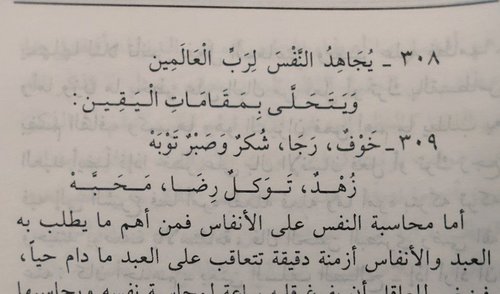
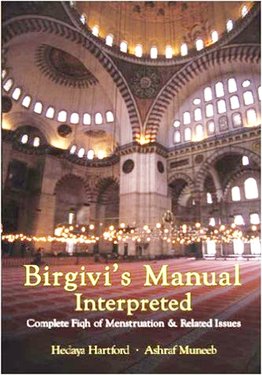

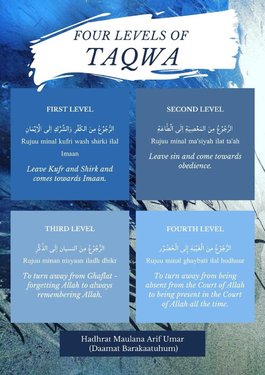

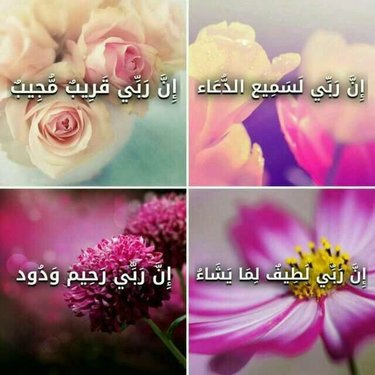
.thumb.jpeg.23be8a0728057cbe6823cc8dd3e936c8.jpeg)
